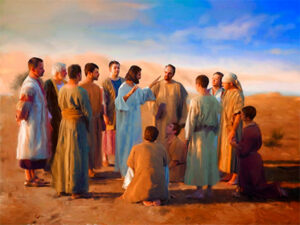 The blessedness (or happiness) Jesus speaks of in the Beatitudes (Luke 6) is found, according to Him, among those who are poor. This is true not only because they are being drawn closer to God, but also because their poverty creates interdependence, a sense of the common good. The poor, for example, know that they need each other, so much so that the only wealth they treasure is the richness of human relationships. They know that when one person is hungry (spiritually or otherwise), all people are malnourished.
The blessedness (or happiness) Jesus speaks of in the Beatitudes (Luke 6) is found, according to Him, among those who are poor. This is true not only because they are being drawn closer to God, but also because their poverty creates interdependence, a sense of the common good. The poor, for example, know that they need each other, so much so that the only wealth they treasure is the richness of human relationships. They know that when one person is hungry (spiritually or otherwise), all people are malnourished.
The happy people Jesus describes are also those who weep – because they never weep alone! There is a solidarity among them, while the rich end up isolated, anxious, and defensive. The rich are fearful that some of what they have amassed will be lost or taken from them. They lead a lonely life, distrusting others, suspicious, and often in denial, even to the point of being offended by the Gospel.
In these Beatitudes, Jesus warns that passivity in the face of others’ needs leads to everlasting woe. With this teaching, He is turning things upside down. His invitation to disciples long ago (and us as well) is to embrace some form of being “poor” as an essential aspect of our commitment to Him. As the Gospel continues, St. Luke will present many examples of how to respond to and embrace poverty. Fishermen and Tax Collectors leave everything behind to follow Jesus. Zacchaeus will give half of his possessions to the poor. In Acts of the Apostles, we will see how the pooling of resources leads to a community that cares for one another. Others will be led to say, “See how they love one another!” Are we ready to take our place in the long line of disciples willing to admit our need for God and our dependence on each other?

